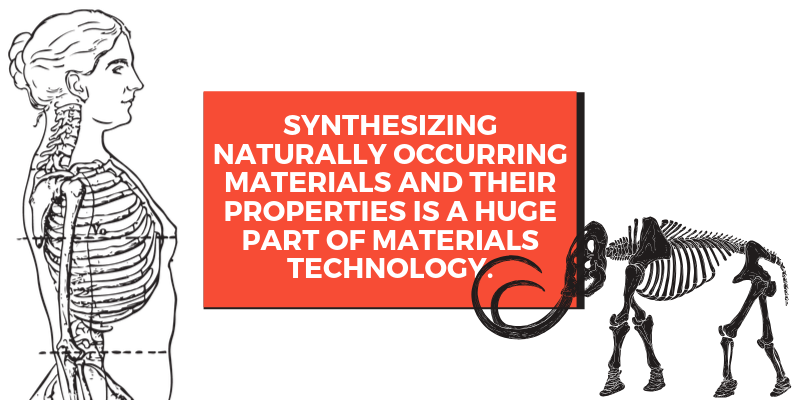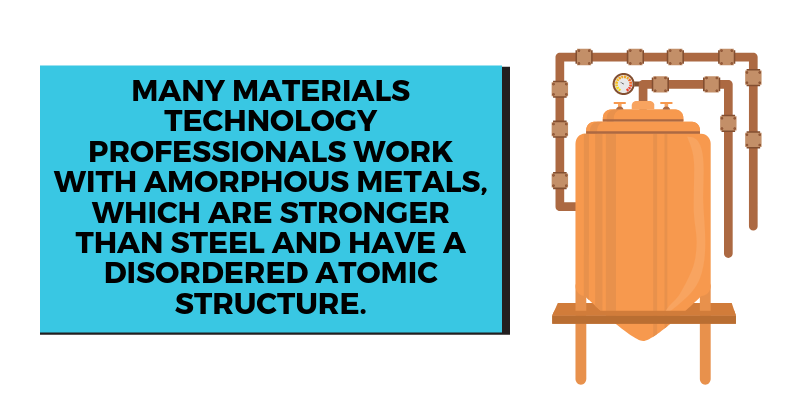![]()
Materials science is a syncretic discipline hybridizing metallurgy, ceramics, solid-state physics, and chemistry. It is the first example of a new academic discipline emerging by fusion rather than fission – Rustum Roy
Materials Technology and Materials Science deal with the discovery, design, and utilization of new solids and other substances. It combines engineering, chemistry, physics, metallurgy, mineralogy, and much more.
This discipline stretches back centuries. In the earliest days of humankind, we used materials like bone, rocks, earth, wood, crystals, and more in new ways to survive and improve our lives. That has evolved throughout the years into working with metals, polymers, glass, and other human-made substances to solve problems and advance the species in countless ways.
By the 19th century there were significant breakthroughs in the field. These included Joseph Aspin’s invention of Portland cement (the most common form of cement, combining stucco, mortar, concrete, and more), Louis Daguerre and William Fox’s use of silver in photography, Charles Fritts’ creation of solar cells using selenium waffles, and Charles Goodyear’s invention of vulcanized rubber. By studying these breakthroughs, you can gain some perspective on what it takes to invent something new or discover a further use for existing materials. Those processes and the results they can offer are the backbone of Materials Technology and Materials Science.

In the 1940s, Materials Technology and Science became a wartime necessity. The materials humans use and their limitations often make or break in human development, whether it’s in military, medical, space, or other vital technologies. This understanding among political and academic elites led to Materials Science and Technology being treated as its own field of study, not just the overlapping of other recognized disciplines. In the 1950s the Department of Defense gave five top universities (Harvard, Brown, MIT, Chicago, and Stanford) $13 million to do material research. From there the field took off in universities throughout the nation.
Currently people working in Materials Technology research are diving into fascinating, evolving areas of science like nanotechnology and biomaterials.
People in this field fill many roles. It’s full of versatile scientists, mathematicians, engineers, thinkers, researchers, academics, and practitioners. If you love math, science, and solving problems through discoveries and inventions, this might be an excellent choice for you.
In this guide we’ll look at the different degree levels in the field, specializations, and what we’ve done to help you find a degree that works for you. We’ll also discuss potential earnings and try to help you decide whether Materials Technology and Science is a good fit for you. Before we dive in, please ask yourself the following:
-
- What are your educational and career goals? How will a degree in Materials Technology Prepare you to reach them?
- Have you been extremely successful throughout your previous math and science education?
- What degree level have you reached thus far? What position are you looking to reach, and what degree level do you need to reach to qualify for it?
- Entry-level Materials Technology positions generally require a Bachelor’s degree. If you want elite positions, or to teach or do research at a top-level you’ll likely need advanced degrees in the field.
roug
- How much can you afford to pay in tuition and other costs for a specific Materials Technology degree you’re looking at, and how much would you have to borrow to afford one?
- Many costs come with a Materials Technology program. These depend on the school you pick, the delivery formats they offer, and more. You should also closely examine what scholarships and loans you qualify for.
- Whenever you can please pick schools you can pay for. For most people, loans are necessary. If you have to borrow money to attend school take out public loans over private ones whenever possible.
- How much time can you spend on a Materials Technology degree daily, weekly, and overall before you complete it? You may have options in several formats.
- Your delivery options might include full-time, part-time, online, on-campus, or in a mixture of online and traditional on-campus instruction. What works for you?
- Where do you want to live and work after earning your degree? Different states, cities, and industries have different demands for professionals in Materials Technology.
- What is your career, educational, and personal experience? How will a specific degree program build on your aptitudes and make up for your weaknesses?
- What are the available specializations in Materials Technology programs? How will a focus area or specialization in the field get you where you need to go within it?

These are just a few of the questions and considerations you should answer about any program you’re looking for in Materials Technology, and any degree program you’re generally considering. Writing out answers to these questions and any others that apply to you that isn’t here is a great way to whittle down programs you’re considering.
Now let’s look at what Materials Technology degrees will build within you:
What Do Materials Technology Degrees Require and Inspire in You?
There are many skills and qualities that lead to successful careers in Materials Technology, Engineering, and Science. Here are a few to consider when deciding whether you’ll do well in these disciplines:
- Love for Discovery: Materials Technology is all about finding and creating new substances, or new ways to use existing materials. You’ll need to have an exploratory heart and a passion for scientific breakthroughs. Remember, producing original work is essential to your success in this field, and that success will be powered by a passion for opening new doors.
- Breadth of Science and Math Skills: These programs require advanced skills and experience in calculus, probability, linear algebra, chemistry, physics, biology, engineering, and much more. If you haven’t excelled in these areas throughout your education, this field probably isn’t right for you.
- Desire to Create Change: Materials Technology is about making or using substances in new ways that produce utility for organizations and consumers alike. You’ll need a dedication to solving problems in new ways to be successful in these programs and throughout your working life.
- Communication and Charisma: Not everyone will have instant, unshakeable faith in you when you’re working on a new idea. You’ll need to explain what you’re doing, why it’s useful, how it can work, and why you need funding and other resources to make it happen. If you want to make your ideas and designs a reality, you’ll need varied and consistent assistance. There’s no substitute for excellent communication skills when it comes to making theoretical concepts practical and concrete.
- Attention to Detail: As with all engineering or engineering-related disciplines, this is crucial, but it’s especially true in materials technology. In this field small changes in a substance can create ripple effects throughout everything you want to do with it, so you’ll need to be extremely observant, organized, and adept at recording everything you learn while you work on these complex projects. Materials technology involves the most microelements of matter up to finished projects and products. It’ll be on you to keep track of everything involved in a way that promotes individual and organizational success.

Now that we’ve seen some of what it takes to work in this field, let’s explore what we’ve done to give you a leg up over your competition:
How Can We Help You Find the Best Materials Technology Degree for You?
At Degree Query we’ve produced many different forms of content to help you find a degree that suits your needs, goals, and interests. We want you to get into an incredible school and complete a program that will improve your life. To help, we’ve answered frequently asked questions about jobs, degrees, schools, as well as higher education and its many disciplines. We’ve ranked degrees and written guides like this one about them. We’ve built tools like our compare careers matrix, an interactive platform that was created to help you find the best path through schools and careers for you. Some of the work we’ve done on Materials Technology and its related disciplines includes:

Rankings
- Top 25 Fastest Online Doctorate Degrees
- Top 50 Degrees for the Future
- Top 50 Degrees For Changing The World
- Top 50 Online Medical Degrees
- Top 10 Highest Paying Engineering Careers
- Top 50 Free International Universities for U.S. Students
- Top 25 Tuition-Free Colleges & Universities
Frequently Asked Questions and Guides
- What Classes Will I Have to Take for a Degree in Materials Engineering?
- What Are the Highest Paying Jobs in Engineering Technology?
- What Is the Difference Between an Engineering Degree and an Engineering Technology Degree?
- What Can I Do With an Aeronautical or Manufacturing Engineering Degree?
- What Can I Do With a Mechanical Engineering Degree?
- What Are the Easiest Degrees to Get in Engineering Technology?
- What Is the Demand for a Degree in Engineering Technology?
- What Degree Do I Need to Be an Organic Chemist?
If you find any schools or programs through our content that you think would be a good fit for your education and career goals, you can help yourself out immensely by reaching out to their support staff directly. There are dedicated workers at most schools who can help you figure out delivery options that work for you, whether you have the qualifications to get accepted, and what financial aid or scholarships you qualify for.

Now let’s explore the different levels of degrees in Materials Technology:
What are the Different Levels of Materials Technology Degrees?
Now let’s explore the different specializations in material technology and material science:
Associates in Materials Technology
These programs take approximately two years to complete. They’ll focus on general education courses, then move you into biology, chemistry, physics, engineering, materials science, and materials technology courses to prepare you to continue your education at the next level. Sample material science courses might include Composites Manufacturing, Composites Engineering Design, Polymer Technology, and more. These programs are often offered online, or by community or junior colleges. You can often save time and money by attending an online or community college in comparison to on-campus universities. Graduates of these programs will be ready to continue their education at the next level:
Bachelors in Materials Technology
In these four-year programs students will get the education you need for entry-level positions in Materials Technology and Materials Science. You’ll explore the electrical, magnetic, optical, chemical, and mechanical properties of numerous materials. These materials include metals, alloys, composites, semiconductors, ceramics, polymers, and more. You’ll discover the limits of these materials, how they can be used to reach different goals, how much they cost, how they perform, and impact costs and profits. You’ll also look at how to minimize their sizes and weights. Sample courses include Transport and Kinetics, Structural Characterization, Mechanical Behavior of Materials, Analytical Materials Characterization, and much more. You’ll also need to work with and study calculus, statistics, probability, linear algebra, organic chemistry, physics, biology, and more. Graduates can also continue forward to earn a graduate degree in the field.
Masters in Materials Technology
In these degrees you’ll learn to do crucial research that impacts the field. For the most part, these degrees can be completed in two years. They generally culminate with a thesis or a comprehensive examination certifying you’ve mastered the discipline. You might take a specialization in an area like environmental, chemical, mechanical, or electrical engineering. You’ll likely need high GRE scores, and a background in engineering, physics, materials technology, astronomy, or another related science. Sample courses might include Crystal Structure, Semiconductors, Nanostructure Characterization, and Materials Thermodynamics. Graduates will be prepared to work in elite positions in Materials Science, Materials Technology, and/or Engineering. They can also go on to earn their doctorate:
Doctorate in Materials Technology
These terminal degrees can be completed in three to five years depending on the course schedule you choose and your previous degree work. You might be able to get funding for these programs and work as a teacher’s assistant while you complete them. You will do specialized research in an area like nanomaterials, polymers, ceramics, thin films, composites, metals, and alloys, among other options. You don’t need to have a Master’s degree in the field to enter one of these programs, but it definitely will help you save time and money in completing one. You might have to take specialized exams about aspects of the field in addition to the GRE to qualify for one of these programs. Core courses in these degrees include Special Problems in Materials Technology, Materials Thermodynamics, and Mechanical Metallurgy. These programs culminate in a thesis and its defense. Graduates will be ready to work in top research, teaching, and practical positions within Materials Technology, Engineering, and Materials Science

Now that we’ve looked at the different levels of Materials Technology degrees, let’s explore focus areas within the discipline:
What are Your Materials Technology Specialization Options?
There are many different areas of Materials Technology you can either study or work in. Here are some of your options:
Advanced Materials Design & Processing
In these specializations you’ll take coursework and do practical assignments in the properties of materials, and learning how to process them for engineering success. You’ll go through business, engineering, management, and mechanical engineering courses as well. Overall you’ll strive to make quick, effective decisions in design and manufacturing that lead to individual and organizational success.
Biomaterials
You’ll explore how the body is designed, and its properties. You’ll also look at how its tissues are organized structurally, compositionally, and more. You’ll gain experience with how bodies react to foreign objects, and how implanted materials can improve organic life. Students will gain technical know-how, medical knowledge, and experience. You’ll also build critical business and management skills, among other benefits. Your work will prepare you to treat devastating diseases, and you can work in biomedical engineering or related fields.
Electronic and Photonic Materials
While conventional materials classes cover things like metals, polymers, and ceramics, here you’ll focus on polymeric films, the basis of most electronic and photonic devices. You’ll explore new technologies, nanoscience, and how inorganic and organic matter is used in a range of electronic devices.

Nanoscience and Nanotechnology
Materials can be created from solids, or at a much smaller, molecular level. In this discipline, you’ll learn to work with molecules to make new structures, devices, and of courses materials that make use of unique properties and can serve new purposes. You might work on new medical devices, modes for drug delivery, atomic-sized chips and memory, or work on energy and environmental problems. Nanotechnology is poised to change many different industries over the coming decades.
Soft Materials and Polymers
Anything organic that falls between fluids and crystals is considered soft materials. You might work with gels, polymers, liquid crystals, colloids, and foams in these fields. Even DNA and polypeptides are part of the soft materials family. You could go on to work with displays, cosmetics, biomaterials, and much more. These programs also prepare students to do vital research in physics, chemistry, materials science, chemical engineering, bioengineering, electrical engineering, and more.
We’re almost through with the guide. Before we go let’s look at what positions you can expect to fill, their future job outlook, and how much you can expect to earn in these roles:
Materials Technology Degrees in Conclusion
On behalf of the Degree Query team, we hope you’ve found this guide interesting, inspirational, informative and influential in your search for a degree in Materials Technology, or another degree that better suits you.
Materials Technology combines engineering, chemistry, and physics to create and better use new physical materials and products that irrevocably change the world around us. They require an incredible passion and knack for science, problem-solving skills, and an ability to produce original work. It’s not for everyone, but if you’ve made it this far, here’s what you can expect to earn in some of the roles in this field.

There are many different positions you can end up in after graduating with a degree in Materials Technology, Materials Science, or a related program. Here are some common ones and what the United States Bureau of Labor Statistics says about employment within them:
- BLS found that Materials Engineers had a 2018 median pay of $92,390 a year. There were 27,700 of these positions in 2018. They predicted no growth in these roles between 2018-28.
- BLS also wrote that Mechanical Engineers boasted a 2018 median pay of $87,370 annually. There 2343 312,900 of these positions in 2018, which was expected to grow between 2018-28 by 4%, leading to 12,800 new positions.
- Aerospace Engineers had a 2018 median pay of $115,220 per year. There were 67,200 of these positions in 2018, which was expected to grow by 2% between 2018-28, leading to 1,100 new roles.
- In 2018 Industrial Engineers had a median pay of $87,040. There were 284,600 of these roles in 2018, which was expected to grow by 8% between 2018-28, with 23,800 new jobs created in the discipline.
- Electrical and Electronics Engineers had a 2018 median pay of $99,070 a year in 2018. There were 330,300 of these positions in 2018. BLS anticipated a 2% growth between 2018-28, heralding 8,00 new jobs in the field.
There are many other jobs and roles you can fill in Materials Technology and Materials Science depending on your education, experience, and interests.
Please remember to help yourself out by contacting any program you find during your search for a degree. By talking to support staffs at schools you’re interested in, you can get invaluable information. They can potentially help with your application, and maybe even find ways to save significant amounts of money on tuition and other costs. You never know what type of rapport you can build with someone who has the power to help you boost your education and career.
Best of luck in your search for the right degree discipline and school to complete it!

